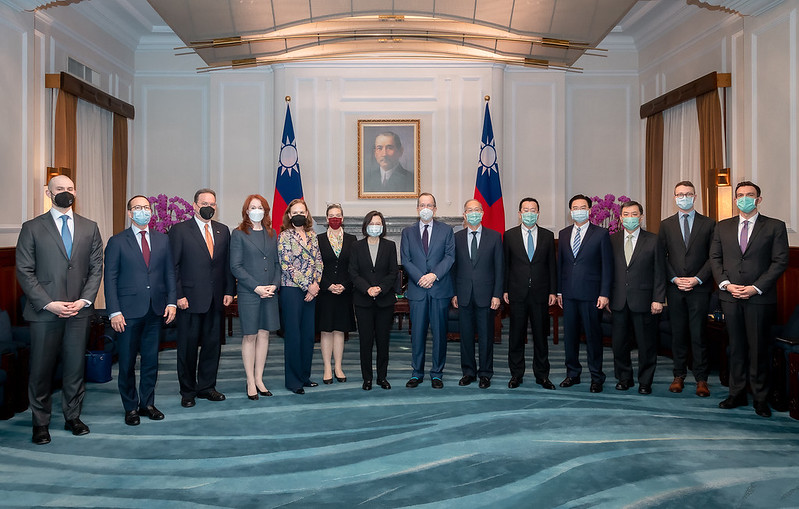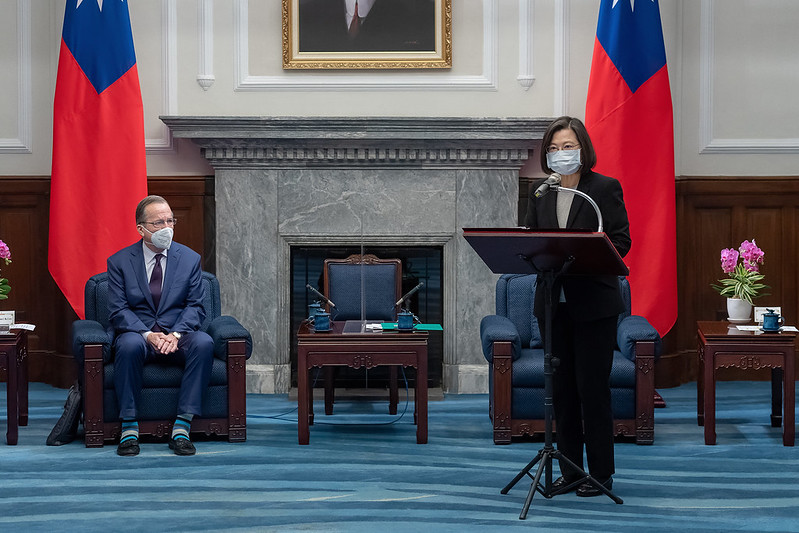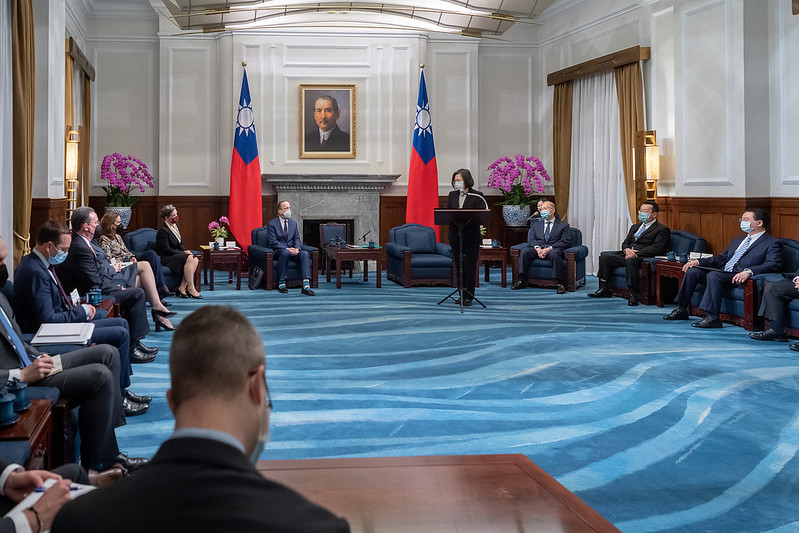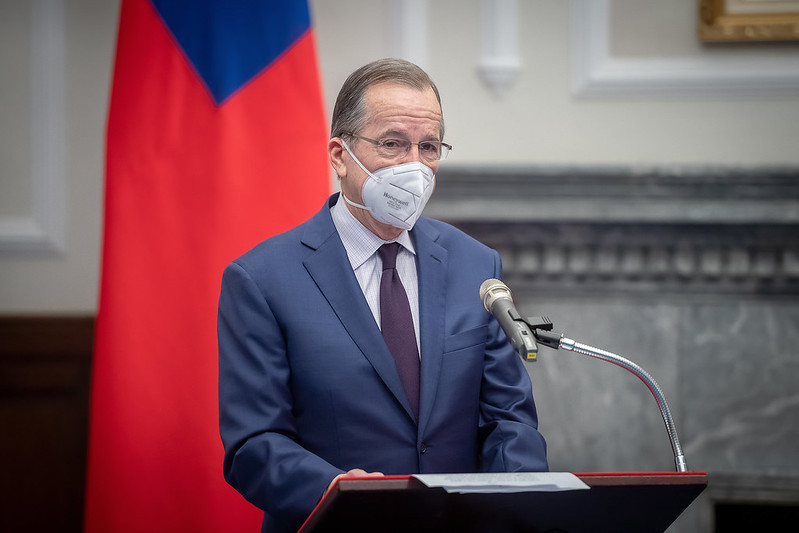News & activities
 News releases
News releases
On the morning of March 2, President Tsai Ing-wen met with a senior bipartisan delegation sent by US President Joe Biden. In remarks, President Tsai reiterated Taiwan's determination to defend ourselves and uphold our free and democratic way of life. She said that Taiwan, which stands on the front line of democracy, is not just a key partner, but also a trustworthy partner for those in the region. The president added that with greater support from the international community and more opportunities for international participation, Taiwan will become even more resilient, and will be able to contribute further to freedom and prosperity around the world. The president also expressed hope that Taiwan and the US can continue to deepen our partnership and work together to advance peace, stability, and development in the Indo-Pacific region and across the globe.
A translation of President Tsai's remarks follows:
I want to extend a warm welcome to you, Admiral [Michael] Mullen, and to the members of your delegation. You have all held senior national security positions spanning multiple US administrations and have played an important part in many initiatives focused on global peace and security, so I am sure that our discussions today will be very fruitful.
At a time when the international community is firmly focused on the situation in Ukraine, President Biden has sent your delegation to Taiwan, which demonstrates the importance the US places on our bilateral partnership and reflects our rock-solid ties. More importantly, your visit highlights Taiwan's role in regional and global security and the need for the international democratic community to be even more united.
Last week, Russia invaded Ukraine, an invasion which has already killed and injured many innocent civilians and has displaced countless others, bringing to light the danger that authoritarian actors pose to global peace and order. Let me take this opportunity to say to all in attendance, and to our friends around the world, that as a member of the international community, Taiwan strongly condemns Russia's invasion and is officially joining the global effort to impose economic sanctions on Russia. We also began providing Ukraine with humanitarian aid two days ago.
With these efforts, we want to make clear that Taiwan stands with Ukraine and all other free and democratic countries. Taiwan will do everything in our power to fulfil our international responsibilities to contribute to peace and security around the globe as well as stability and prosperity in the region, and we are willing to work together with any and all countries toward this goal.
History teaches us that if we turn a blind eye to military aggression, we only worsen the threat to ourselves. Now is the time for all democracies around the world to come together. Taiwan cannot and will not be absent from this effort. The Ukrainian people's commitment to protect their freedom and democracy and their fearless dedication to defending their country have been met with deep empathy from the people of Taiwan, as we too stand on the front line of the battle for democracy.
At present, China's military threat to the Taiwan Strait and to the region continues to rise. Whether by working to limit Taiwan's international participation, or by using cognitive warfare tactics and disinformation to divide Taiwanese society and erode our democracy, China's actions on this front have never ceased. But nor have the Taiwanese people given up on our convictions because of these actions. We in Taiwan want the world to know that we have the determination to defend ourselves and uphold our free and democratic way of life.
The stability and security of the region has never been the exclusive concern of any one country. Indeed, the crisis in Ukraine has shown the world that cooperation and coordinated action among democratic countries is crucial. Facing threats to the security of the Taiwan Strait and the region, we look forward to working even more closely with the US and other stakeholders in the region, collectively responding to challenges and unilateral actions that could impact security in order to maintain regional peace and stability.
Here, I want to thank the Biden administration for taking concrete action under the Taiwan Relations Act and the Six Assurances to uphold the US security commitment to Taiwan and help Taiwan strengthen our self-defense capability. The two arms sale packages approved by the Biden administration, as well as today's visit from all of you, are the clearest proof of this commitment.
Last month, the Biden administration published the latest version of the US Indo-Pacific Strategy, which names Taiwan as a leading partner in the region. I want to tell you all that Taiwan, standing on the front line of democracy, is not just a key partner, but a trustworthy partner as well. With more support from the international community and more opportunities for international participation, Taiwan will become even more resilient, and will be able to contribute even more to freedom and prosperity around the world.
I hope that Taiwan and the US can continue to deepen our partnership and work together to advance peace, stability, and development in the Indo-Pacific region and across the globe.
The following is a transcript of Admiral Michael Mullen's remarks:
On behalf of the delegation, I want to thank you for your welcoming and kind words, and for your strong leadership not only here in Taiwan, but in this increasingly critical region in the world where continued peace and stability has never been more important. It's an honor to be here.
I lead this delegation of private citizens to voice our support for the continued and growing strength of the vital partnership between the United States and Taiwan. We come to Taiwan at a very difficult and critical moment in world history. As President Biden has said, democracy is facing sustained and alarming challenges, most recently in Ukraine. Now more than ever, democracy needs champions.
Today, Madam President, this delegation is proud to be visiting one of the world’s most vibrant democracies. Taiwan is tackling the leading challenges of our time, whether it be a global pandemic or corrosive disinformation and malign influence, without sacrificing core democratic values.
You are a global leader in promoting human rights, women's empowerment, and an inclusive society. Taiwan came to the American people's aid during the earliest days of the COVID-19 pandemic. You were the single largest donor of masks to the United States, for which we remain deeply grateful.
This delegation reflects the bipartisan nature of support for the United States' strong partnership with Taiwan. Maintaining peace and stability across the Taiwan Strait is not just a US interest, but also a global one. That is why the United States will continue to oppose any unilateral changes to the status quo and will continue to support a peaceful resolution of cross-strait issues consistent with the wishes and best interests of the people of Taiwan. I do hope by being here with you, we can reassure you and your people, as well as our allies and partners in the region, that the United States stands firm behind its commitments.
April will mark the 43rd anniversary of the signing of the Taiwan Relations Act, which President Biden voted for early in his senate tenure. Forty-three years later cooperation between the United States and Taiwan is stronger, deeper, and more expansive than ever before. We are grateful to Taiwan and President Tsai for your partnership and we look forward to our discussions later today.
Also present at the meeting were Michèle Flournoy, former under secretary of defense for policy; Dr. Meghan O'Sullivan, former White House deputy national security advisor; Dr. Michael Green and Dr. Evan Medeiros, former senior directors for Asian affairs at the White House National Security Council; and American Institute in Taiwan Taipei Office Director Sandra Oudkirk.












